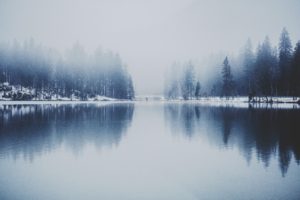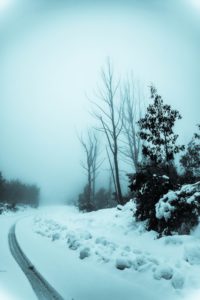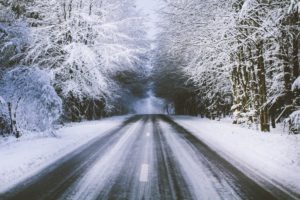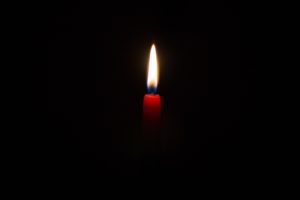The Kindness of Strangers
 We woke to a snowstorm this morning in central Maine. I could hardly wait to get out in it and walk. It was snowing hard and accumulating fast, coming down in heavy, wet flakes. I headed to work midmorning, maneuvering out of the driveway with some difficulty. The ground was already well saturated before this storm.
We woke to a snowstorm this morning in central Maine. I could hardly wait to get out in it and walk. It was snowing hard and accumulating fast, coming down in heavy, wet flakes. I headed to work midmorning, maneuvering out of the driveway with some difficulty. The ground was already well saturated before this storm.
Getting out of the driveway is the hardest part of winter driving here. I’ve been amazed at how well the roads are taken care of in Maine, much better than the rural roads and streets in Colorado. Still, winter driving is winter driving, and I gave myself plenty of time.
I quickly discovered the paved road was every bit as treacherous and without traction as the driveway. There was a heavy coating of slush and no sign of sanding or plowing. If I went over 30 miles an hour I lost traction and I almost couldn’t climb the steepest hill on the way into town. I turned on my audiobook, sipped my travel mug of tea, and settled down for a slow and careful commute, wondering why the road crews seemed to be ignoring the dangerous conditions.
 I started down a gently sloping hill with a shallow curve. One minute I was driving and the next I was floating. I was alone on the road. Nothing happened. I hadn’t accelerated or braked or jerked the wheel. I just started slipping across a thin layer of slush between the tires and the pavement, and I knew I wasn’t going to make the curve. I kept my feet off the pedals and tried to steer into the skid, but the tires might as well have been glass slippers, for all the traction they had.
I started down a gently sloping hill with a shallow curve. One minute I was driving and the next I was floating. I was alone on the road. Nothing happened. I hadn’t accelerated or braked or jerked the wheel. I just started slipping across a thin layer of slush between the tires and the pavement, and I knew I wasn’t going to make the curve. I kept my feet off the pedals and tried to steer into the skid, but the tires might as well have been glass slippers, for all the traction they had.
I was very lucky. The side of the road was thickly edged with woody shrubs like alder and willow. I didn’t hit a pole, tree or fence, and I wasn’t going fast. I also didn’t land in water, a real danger here in Maine. I recognized the weightless feeling in the pit of my stomach and knew I was helpless, a victim of momentum. All I could do was sit tight and wait for the car to stop. I wasn’t at all scared. I had a seatbelt on and I was only coasting.
I’m going to be late for work, I thought, resigned.
The brush and bushes caught me neatly. I turned off the audiobook and engine, turned on the hazard lights, gathered up my keys, wallet and travel mug of tea — not a drop had spilled — and set out for the nearest house.
I was greeted by the baying of several dogs, the alarm calls of a pair of geese and a woman about my own age with very blue eyes. I explained, said I didn’t have a cell phone, and asked if I could call for help.
She was extremely kind. The dogs were contained somewhere while I waited. The geese eyed me balefully. When I stepped inside, the house was warm and a stove glowing. It was a typical farmhouse kitchen, cluttered, friendly, comfortable, filled with plants. She handed me her cell phone, introduced herself as Sarah, and asked if I was hurt. I reassured her I was perfectly unharmed, called my partner and called work. I was about to call AAA when she offered to pull me out with her tractor.
I dithered. I have a horror of being a burden or needing help. Why should this woman leave her cozy kitchen and go out into the snow and slush to pull a stranger out of the ditch? She told me to stop apologizing and pointed out that AAA would likely take a long time to respond, given the local conditions. We both wore heavy mud/snow/rain boots. She flung on an old yellow slicker and fired up the tractor.
The tractor couldn’t get any traction, either. It churned up mounds of mud and grass, but the chain wasn’t long enough to allow it to pull from the pavement, and she came close to sliding sideways into the ditch, just as I had done.
At this point we’d both been lying on the slushy, muddy ground hooking up chains, the snow was coming down in wet clots, and the narrow rural road we were on was extremely hazardous. Sarah took the tractor back and returned with “Tank.” Tank is an old-fashioned heavy farm truck, painted in camo and looking indestructible.
Tank couldn’t pull me out, either.
 During all this, everyone who went by stopped to ask if we needed help.
During all this, everyone who went by stopped to ask if we needed help.
The snow turned to heavy rain.
We went back to the house and I called AAA.
I wanted to wait for the tow truck in the car, but Sarah wouldn’t hear of it. We could see the car from her kitchen window. We were both wet and muddy to the skin. We sat at the kitchen table and talked about our sons (her two and my two) and what we’d done with our lives so far. Every car that went by mine either slowed or stopped. We were so worried someone else would go off the road or my mishap would cause another accident, we put a note on the car window saying Nobody hurt. Waiting for tow truck.
About an hour later a big tow truck pulled up. I thanked Sarah from the bottom of my heart, put my sodden coat back on and went out into the pouring rain. There were two young guys in the truck. They considered the problem, walking around the car in their heavy boots and the bulky waterproof gear all the working men seem to wear here. They decided the only way to get me out was to pull me sideways back onto the road. I was shivering by that time. I got in the driver’s seat, rolled down the window (I could hardly have been wetter), and prepared to follow directions.
While they were working the road was effectively blocked. A big pickup truck came along, pulled into the center of the road behind the tow truck, and turned on his hazards.
They pulled this way and that. I went from neutral to park and back again. I braked when they told me to. The rain ran down my face and neck and under my coat and other clothing. Branches scraped across the car. The winch whined. Mud and slush churned. A few vehicles waited patiently. We finally got two tires on the road. They got behind me and told me to accelerate nice and slow. I did so, they pushed, and the tires found the pavement again.
I thanked them wholeheartedly. I waved to the kind and patient human being who blocked traffic and kept us all safe.
This morning in Maine there have been many, many accidents, including a flipped-over school bus, snowplows off the road, jackknifed trucks and people like me sliding into ditches, power poles and other cars. There have been cancellations, delays and detours. We are warned of flooding. This afternoon and tonight we expect freezing rain. The storm is not over, but my adventures for the day are. I crept back home three hours after I left it, shivering, wet and exhausted, and promptly got stuck in the driveway.
How do we thank the strangers who brush against our lives and lend a helping hand? I’ve never known. A simple thank you seems so wholly inadequate. Still, what else can I say? What about all those anonymous strangers who help in ways we never know about, or come and go so quickly we don’t even see their faces? As an old first responder, I know how essential traffic control is, but I don’t know if the driver who shielded us and stopped traffic was a man or woman. I suspect everyone’s plans were disrupted this morning, but people slowed and stopped to make sure the driver of the car in the ditch was not injured or needing help. Treacherous roads, blinding snow and then rain, a dark November day, and ordinary men and women willing to assist in spite of it, willing to leave their warm firesides and kitchens, willing to climb out of their dry, cozy vehicles, willing to do what they could for a stranger.
These are the darkest times I’ve seen in America in my lifetime, but this morning my faith in humanity was renewed. A series of strangers helped me when I was in need, and because of them I’m back home, safe, dry and warm. I’m grateful. I also know that all over the world people are practicing small acts of kindness all the time, ordinary people going about their business in neighborhoods, communities and at work. This post is for them.
Thank you for checking to make sure a stranded driver is okay. Thank you for answering a stranger’s knock at your door. Thank you for offering a cell phone or other means of communication to someone who is stuck without the ability to call for help. Thank you for helping direct or block traffic so further accidents don’t occur. Thank you for being patient when an accident holds you up. Thank you to all those first responders, tow truck drivers, utility company workers and the other hundreds of thousands who are there with tow chains, chainsaws, shovels and tractors when the unexpected happens. You might be doing your job, but thank you anyway for your smiles, your kindness, your expertise, your willingness to contribute, your difficult and often risky work, and your humanity.
My hope lies in all of us who do what we can in our little corner of the world. The simple, humble kindness of strangers may, in the end, save us.
All content on this site ©2018
Jennifer Rose
except where otherwise noted
